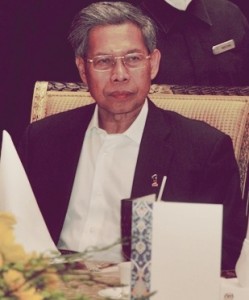
The Geneva based non-profit foundation, World Economic Forum, today released the fourth edition of its Global Enabling Trade Report 2012entitled “Reducing Supply Chain Barriers”. The report measures the extent to which individual economies have developed institutions, policies and services facilitating free flow of goods over borders to destinations. A total of 132 countries were surveyed for the 2012 Report compared to 125 in 2010.
In this report, Malaysia strengthens its overall enabling trade performance by 6 positions and moves up to 24thposition out of 132 economies (2010: 30 out of 125 economies). This ranking places Malaysia among the top 20% of global trade enabled economies.
Among Asia Pacific countries, Malaysia improved two positions, ranking 6th among 21 Asia Pacific countries, ahead of Taiwan (7th) and Korea (8th). The top 10 most trade enabled economies are Singapore, Hong Kong, Denmark, Sweden, New Zealand, Finland, Netherlands, Switzerland, Canada and Luxembourg.
The findings of the WEF Report are based on an analysis of 4 enablers of trade:
• Business Environment
• Market Access
• Border Administration
• Transport and Communications Infrastructure.
Malaysia registered the biggest improvement in the Business Environment category, achieving an improved ranking of 21 positions to 30th from 51st position in 2010. This is attributed to improvements in efficiency of the financial market (8th), the strong business impact of rules (11th), strong domestic competition (13th) and solid property rights (24th).
Malaysia continues to rank high in the category of Transport and Communications Infrastructure (20th). This is attributed to the availability and quality of transport infrastructure (12th) and services (10th), transshipment connectivity (13th), the quality of port infrastructure (15th) as well as liner shipping connectivity index (7th). It is notable that Malaysia is the benchmark country in this category, ranking 1st for indicators on cost of imports and exports. The Report noted that the cost of imports and exports for Malaysia is the lowest among 132 countries.
The Report not only measures the abilities of economies to enable trade, but also highlights strengths and areas where improvements are most needed. Areas of concern identified are:
• Efficiency of Customs Administration (47th)
• Physical Security (46th)
• Transparency of Border Administration (42nd)
• Availability and Use of ICTs (37th).
Malaysia’s improved ranking in this WEF Report reflects the impact of the measures the Government has undertaken over the last two years to improve the competitiveness of the Malaysian economy. These wide ranging measures include improvements in the delivery and efficiency of public services, and increased transparency and accountability.
The Government welcomes these findings of the WEF Report, and will continue with the transformation programme to make Malaysia one of the most competitive nations in the world.
In this report, Malaysia strengthens its overall enabling trade performance by 6 positions and moves up to 24thposition out of 132 economies (2010: 30 out of 125 economies). This ranking places Malaysia among the top 20% of global trade enabled economies.
Among Asia Pacific countries, Malaysia improved two positions, ranking 6th among 21 Asia Pacific countries, ahead of Taiwan (7th) and Korea (8th). The top 10 most trade enabled economies are Singapore, Hong Kong, Denmark, Sweden, New Zealand, Finland, Netherlands, Switzerland, Canada and Luxembourg.
The findings of the WEF Report are based on an analysis of 4 enablers of trade:
• Business Environment
• Market Access
• Border Administration
• Transport and Communications Infrastructure.
Malaysia registered the biggest improvement in the Business Environment category, achieving an improved ranking of 21 positions to 30th from 51st position in 2010. This is attributed to improvements in efficiency of the financial market (8th), the strong business impact of rules (11th), strong domestic competition (13th) and solid property rights (24th).
Malaysia continues to rank high in the category of Transport and Communications Infrastructure (20th). This is attributed to the availability and quality of transport infrastructure (12th) and services (10th), transshipment connectivity (13th), the quality of port infrastructure (15th) as well as liner shipping connectivity index (7th). It is notable that Malaysia is the benchmark country in this category, ranking 1st for indicators on cost of imports and exports. The Report noted that the cost of imports and exports for Malaysia is the lowest among 132 countries.
The Report not only measures the abilities of economies to enable trade, but also highlights strengths and areas where improvements are most needed. Areas of concern identified are:
• Efficiency of Customs Administration (47th)
• Physical Security (46th)
• Transparency of Border Administration (42nd)
• Availability and Use of ICTs (37th).
Malaysia’s improved ranking in this WEF Report reflects the impact of the measures the Government has undertaken over the last two years to improve the competitiveness of the Malaysian economy. These wide ranging measures include improvements in the delivery and efficiency of public services, and increased transparency and accountability.
The Government welcomes these findings of the WEF Report, and will continue with the transformation programme to make Malaysia one of the most competitive nations in the world.
